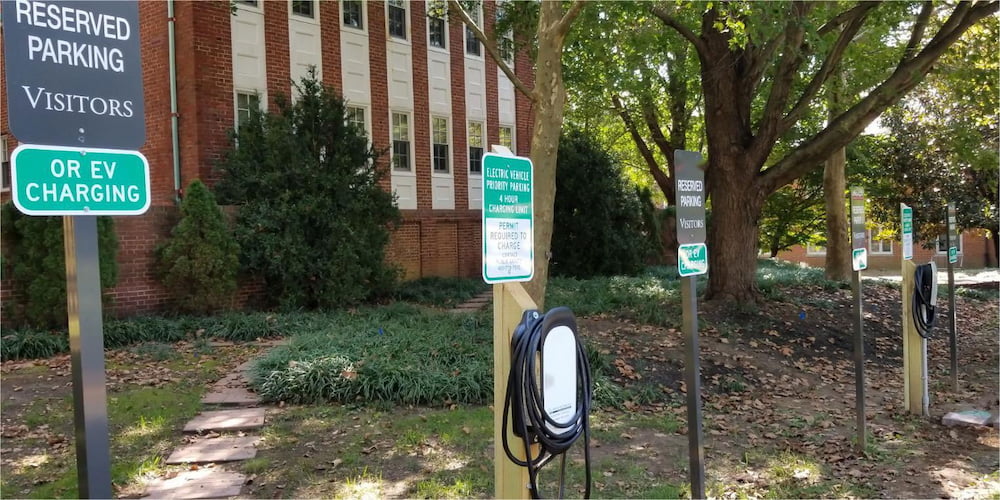Introduction
In today’s rapidly evolving world, sustainability is a key concern across all sectors. One of the most significant contributors to greenhouse gas emissions is the transportation sector, and electric vehicles (EVs) are emerging as a cleaner alternative to traditional gas-powered vehicles. As the world transitions towards a more sustainable future, educational institutions are recognizing the need to embrace this change. Installing EV charging stations on school campuses not only aligns with the principles of sustainability but also offers numerous benefits to students, staff, and the institution as a whole. For more advantages, that will be a good chance for you to explore our EV charging solution for education.
Why Schools Need to Introduce EV Charging Stations

Promoting Sustainability: Educational institutions have a responsibility to lead by example and instill values of sustainability in their students. By introducing EV charging stations on campus, schools can demonstrate a commitment to reducing their carbon footprint and promoting environmentally responsible practices.
Encouraging EV Adoption: As the popularity of electric vehicles continues to rise, it is essential to provide the necessary infrastructure to support EV adoption. Installing charging stations on campus can encourage students and staff to consider transitioning to electric vehicles, contributing to a reduction in greenhouse gas emissions.
Meeting Regulatory Requirements: Many regions and countries are introducing regulations to reduce emissions from the transportation sector. By installing EV charging stations, schools can ensure compliance with these regulations and avoid potential penalties or restrictions on their operations.
Suitable Types of EV Charging Infrastructure for Campuses
When it comes to selecting the appropriate type of EV charging infrastructure for a school campus, several factors should be considered:
Level 2 Charging Stations: Level 2 charging stations are a popular choice for school campuses. They offer a moderate charging speed, making them suitable for longer parking durations typical on campuses. These chargers can fully charge an EV in a few hours, making them ideal for students and staff who spend extended periods on campus.
Universal Compatibility: It’s essential to choose charging stations that support a wide range of EV makes and models. This ensures inclusivity and accessibility for all members of the campus community who drive electric vehicles.
Scalability: Consider the future growth of EV adoption on campus. The charging infrastructure should be scalable to accommodate an increasing number of EVs over time. Planning for expansion now can save costs and hassle down the road.
How to Provide EV Charging Services on Campus

Collaborate with Experts: Schools should collaborate with experts in EV charging infrastructure to ensure proper installation, safety, and compliance with regulations. Engaging with established EV charging service providers can streamline the process and ensure a reliable and user-friendly system. We provide 24/7 serives on our EV charging solutions.
Location Planning: Identify strategic locations on campus for the placement of charging stations. Consider areas near parking lots, dormitories, or other high-traffic areas. Additionally, ensure that charging stations are accessible to individuals with disabilities.
Payment and Access: Determine the payment and access methods for EV charging stations. Options may include pay-per-use, monthly subscriptions, or even free charging as a perk for students and staff. Access should be convenient, such as through a mobile APP or RFID cards.
GREENC’ EV charging stations are supported OCPP, RFID and APP functions, it’s convenient for school management to control the EV charging system, and also easy for staff and students to recharger their EVs.
Maintenance and Support: Regular maintenance is crucial to ensuring the reliability and safety of EV charging stations. Establish a maintenance schedule and support system to address any issues promptly. This will enhance user satisfaction and extend the lifespan of the infrastructure.
Benefits of Introducing EV Charging Stations on Campus
Environmental Impact: Installing EV charging stations reduces the carbon footprint of the campus by promoting the use of electric vehicles, which produce fewer emissions than traditional gasoline-powered vehicles.
Attracting and Retaining Students: Sustainability initiatives, including EV charging stations, can attract environmentally conscious students and staff. It also enhances the reputation of the institution, potentially increasing enrollment and retention rates.
Cost Savings: While the initial investment in EV charging infrastructure can be substantial, schools can generate revenue from charging fees. Additionally, electric vehicles tend to have lower operating and maintenance costs, which can benefit both the institution and individuals.
Community Engagement: EV charging stations can be opened to the local community, fostering positive relationships with neighbors and showcasing the school’s commitment to sustainability.
Research Opportunities: Schools can use EV charging stations as a basis for research and educational opportunities in fields such as renewable energy, transportation, and sustainability.
Conclusion
The introduction of EV charging stations on school campuses is not just a sustainable choice; it’s a strategic investment in the future. By promoting EV adoption, schools can lead by example, meet regulatory requirements, and create a greener, more sustainable campus environment. Moreover, the benefits extend beyond environmental considerations, encompassing cost savings, community engagement, and educational opportunities.
As the world continues its transition towards a cleaner and more sustainable future, educational institutions have a unique opportunity to shape the minds of future leaders and drive positive change. Installing EV charging stations on campus is a tangible step towards that goal, offering a practical solution that benefits the institution, its community, and the planet as a whole.







